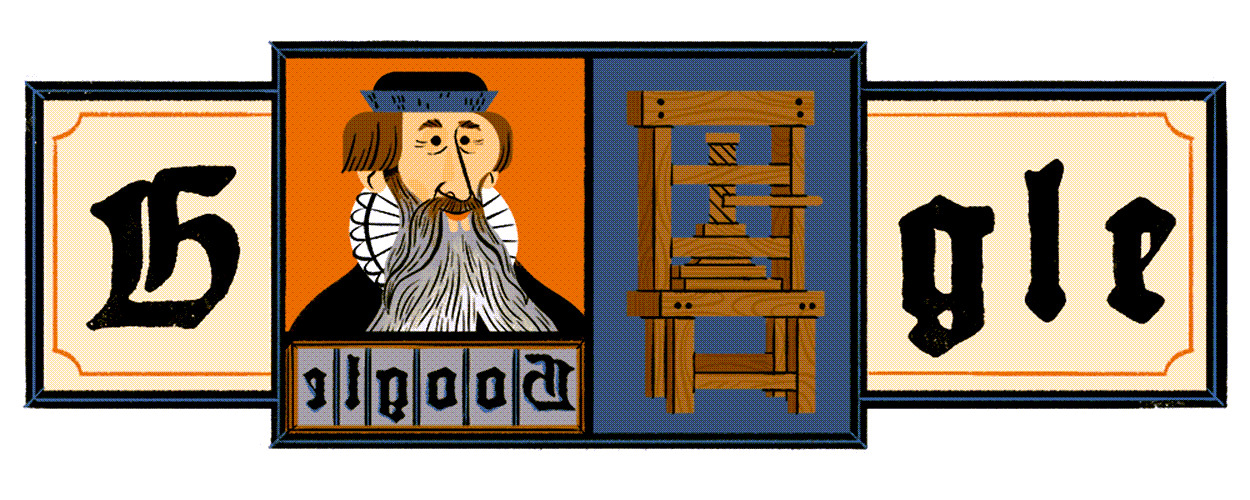Johannes Gutenberg: Inventor of the Printing Press and Catalyst for the Printing Revolution

Image Courtesy: Google Doodle
Johannes Gutenberg (1398 – 3 February 1468) was a German inventor and craftsman who introduced letterpress printing to Europe with his movable-type printing press.
Life and Career
Johannes Gutenberg was born around 1398 in Mainz, Germany, into a wealthy family involved in the metalworking and textile trade. Little is known about his early life and education. He grew up in an era of significant social and technological changes in Europe, and his inventive mind was influenced by the emerging technologies of his time.
Gutenberg’s most significant contribution to history was the development of the printing press with movable type. Before Gutenberg’s invention, books were copied by hand, which was a laborious and time-consuming process, making books expensive and accessible only to the elite. Gutenberg’s invention allowed for mass production of books, making them more affordable and widely available to the general public.
Gutenberg’s invention of the printing press with movable type is believed to have taken place around the 1440s. He developed a system in which individual letters, punctuation marks, and other characters could be arranged in a tray to create words and sentences. These characters, known as movable type, could be inked and pressed onto paper to create multiple copies of a text. This method of printing was much faster and more efficient compared to hand-copying, revolutionizing the process of book production.
Gutenberg’s most famous work, the Gutenberg Bible, was printed using his new printing press with movable type. The Gutenberg Bible, also known as the 42-line Bible, was printed around 1455 and is considered one of the most important books in the history of printing. It was the first major book printed in Western Europe with movable type and is renowned for its high quality and craftsmanship.
Despite his pioneering invention, Gutenberg faced financial challenges and legal disputes, and he struggled to establish a successful printing business. He also faced competition from other printers who adopted and improved upon his invention. Gutenberg’s invention of the printing press, however, had a profound impact on society, facilitating the spread of knowledge, the growth of literacy, and the dissemination of ideas during the Renaissance and the Reformation.
Gutenberg’s invention of the printing press is considered a landmark in human history and is often referred to as the “Printing Revolution.” It laid the foundation for the development of modern printing and publishing industries, which have shaped the world of literature, education, science, and communication ever since. Gutenberg’s legacy as an inventor and printer continue to be celebrated, and his contributions to human civilization are widely recognized today. He died on 3 February 1468 in Mainz.
Award and Legacy
The legacy of Johannes Gutenberg is profound and far-reaching, as his invention of the printing press with movable type had a significant impact on human civilization. Some of the key aspects of Gutenberg’s legacy include:
- Revolutionizing the Printing and Publishing Industry: Gutenberg’s invention of the printing press with movable type transformed the way books and other printed materials were produced. It enabled mass production of books, making them more affordable and accessible to a wider audience. This revolutionized the printing and publishing industry, laying the foundation for modern printing technologies and creating new opportunities for disseminating knowledge and ideas.
- Spreading Knowledge and Literacy: The printing press made it possible to produce books in large quantities, leading to the widespread dissemination of knowledge and ideas. It facilitated the growth of literacy, as more people had access to printed materials and could learn to read and write. This, in turn, contributed to the spread of education, the advancement of science, and the exchange of ideas across borders, fostering intellectual and cultural development.
- Fueling the Renaissance and the Reformation: The invention of the printing press played a crucial role in the Renaissance and the Reformation movements. It enabled the dissemination of classical texts during the Renaissance, which inspired new ideas and led to cultural and intellectual advancements. During the Reformation, the printing press allowed for the wide distribution of religious texts, contributing to the spread of Protestantism and challenging the monopoly of the Catholic Church.
- Advancing Technology and Innovation: Gutenberg’s invention of the printing press with movable type was a technological breakthrough that opened the door to further advancements in printing technology. It laid the foundation for the development of modern printing techniques and machinery, leading to continuous innovations in the field of printing and publishing. Today, printing technologies continue to evolve, driven by Gutenberg’s pioneering invention.
- Cultural Preservation and Diversity: The printing press made it possible to reproduce and preserve written works, including those from different cultures and languages. It contributed to the preservation of cultural heritage, allowing for the reproduction of ancient texts and manuscripts that might have otherwise been lost over time. It also facilitated the printing of texts in different languages, promoting cultural diversity and facilitating cross-cultural exchanges.
Johannes Gutenberg’s invention of the printing press with movable type had a profound and lasting impact on human civilization. It revolutionized the printing and publishing industry, spread knowledge and literacy, fueled intellectual and cultural advancements, advanced technology and innovation, and contributed to cultural preservation and diversity. Gutenberg’s legacy continues to be celebrated, and his invention remains one of the most significant milestones in human history. On 14 April 2021, Google celebrated Johannes Gutenberg with a doodle. On 14 April 2000, Gutenberg Museum launched a retrospective exhibition in his honor.
Observer Voice is the one stop site for National, International news, Sports, Editor’s Choice, Art/culture contents, Quotes and much more. We also cover historical contents. Historical contents includes World History, Indian History, and what happened today. The website also covers Entertainment across the India and World.

